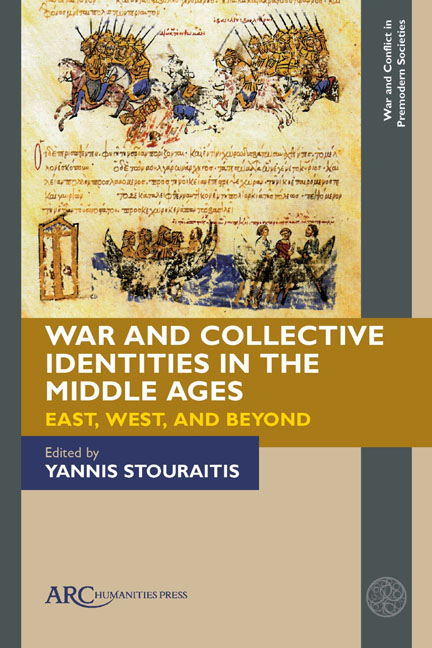Book contents
- Frontmatter
- Contents
- Notes on Contributors
- Chapter 1 War and Peoplehood in the Middle Ages: An Introduction
- Chapter 2 War and Peoplehood through Time: A Sociological Longue Durée Perspective
- Chapter 3 Making War Ethnic: Arab– Persian Identities and Conflict on the Euphrates Frontier
- Chapter 4 Captive Identities: Inscribing Armenianness from Sebēos to Ayrivanec‘i
- Chapter 5 War and Identity in Early Medieval Bulgaria
- Chapter 6 Collective Identifications in Byzantine Civil Wars
- Chapter 7 Warfare and Peoplehood: The Vikings and the English
- Chapter 8 Medieval European Civil Wars: Local and Proto-national Identities of Toulousains, Parisians, and Prague Czechs
- Chapter 9 The Crusades and French Political Identity in the Thirteenth-Century Mediterranean
- Chapter 10 The Song– Jurchen Conflict in Chinese Intellectual History
- Chapter 11 Faithful to a Vanishing Past: Narrating Warfare and Peoplehood in Yuan China
- Chapter 12 War and Collective Identifications in Medieval Societies: Drawing Comparisons
- Selected Bibliography
- Index
Chapter 11 - Faithful to a Vanishing Past: Narrating Warfare and Peoplehood in Yuan China
Published online by Cambridge University Press: 28 December 2023
- Frontmatter
- Contents
- Notes on Contributors
- Chapter 1 War and Peoplehood in the Middle Ages: An Introduction
- Chapter 2 War and Peoplehood through Time: A Sociological Longue Durée Perspective
- Chapter 3 Making War Ethnic: Arab– Persian Identities and Conflict on the Euphrates Frontier
- Chapter 4 Captive Identities: Inscribing Armenianness from Sebēos to Ayrivanec‘i
- Chapter 5 War and Identity in Early Medieval Bulgaria
- Chapter 6 Collective Identifications in Byzantine Civil Wars
- Chapter 7 Warfare and Peoplehood: The Vikings and the English
- Chapter 8 Medieval European Civil Wars: Local and Proto-national Identities of Toulousains, Parisians, and Prague Czechs
- Chapter 9 The Crusades and French Political Identity in the Thirteenth-Century Mediterranean
- Chapter 10 The Song– Jurchen Conflict in Chinese Intellectual History
- Chapter 11 Faithful to a Vanishing Past: Narrating Warfare and Peoplehood in Yuan China
- Chapter 12 War and Collective Identifications in Medieval Societies: Drawing Comparisons
- Selected Bibliography
- Index
Summary
THE MONGOL CAMPAIGNS in East Asia in the thirteenth and fourteenth centuries affected perceptions of ethnicity and identification in many ways: they reshaped territorial boundaries, led to the destruction of existing kingdoms, and to the creation of new ones. In terms of demography, the medieval Mongols triggered the movement of large groups from one corner of Eurasia to the other through the mobility of military personnel and troops, such as Central Asian troops engaged in the conquest of Yunnan, but also through the migration of refugees into Southeast Asia. This movement involved both prominent individuals, as part of the Mongols’ administrative policies and the social mobility resulting from them, and mass migration, radically changing the ethnic landscape of East Asia.
Warfare, alongside other dynamics, played a major role in enabling the creation of new ways of identification, as the Mongol worldview was famously built around the dichotomy of “enemies and allies” (il bulγa irgen), a military-based narrative which then applied, alongside the expansion of the empire, to all aspects of society. From social groups to administrative offices and geographical perceptions, the medieval Mongols developed a new language to refer to the non-Mongol identities that they conquered, and new rules to administer them. Alliances or repeated displays of loyalty during crucial moments of Mongol expansion became the basis on which many non-Mongol citizens of the empire constructed a new career and a new identity for themselves, as well as for their lineages. In the available sources, this is often symbolically connected with recurring ritual elements associated with Inner Asian traditions, such as the granting of a new name or title by the emperor. Thus, the perception of belonging to a certain community was achieved, in Mongol Eurasia, by a constant renarration of the construction of the empire through its crucial moments, and through the ritualized construction of a collective memory. This impacted not only the identity of individuals and elites, but also the sense of belonging of communities and political groups in Mongol-ruled East Asia.
- Type
- Chapter
- Information
- War and Collective Identities in the Middle AgesEast, West, and Beyond, pp. 191 - 202Publisher: Amsterdam University PressPrint publication year: 2023



